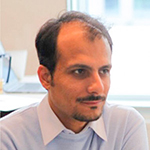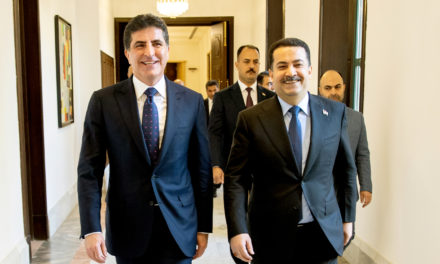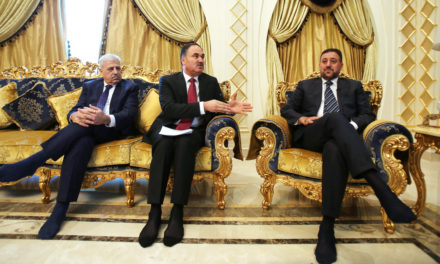On October 29, 2017 the Kurdish parliament convened to discuss Masoud Barzani’s letter formally announcing that he will no longer seek an extension of his overdue presidency after November 1, 2017. Analyzing the content of his letter and speech along with the events that accompanied his resignation presents another showcase of how the Kurdistan Democratic Party (KDP) deals with the current developments in the region, and some unmistakable indicators of how it will do so in the future.
Masoud Barzani’s use of phrases like “I refuse to continue in the position of president of the region after November 1” in his resignation letter although his presidency was extended twice without elections; his condemnation of the U.S. in his resignation speech and questioning of why Washington would want to “punish Kurdistan”; his claim that “Iraq no longer believes in Kurdish rights”; his accusations against members of the Patriotic Union of Kurdistan (PUK) for being guilty of “high treason” because they ordered the withdrawal of the Peshmerga loyal to them from Kirkuk; all these present evidence that no change is to be expected in the future when it comes to the narrative KDP chooses to utilize. Furthermore, while not the most dominant narrative throughout the Kurdistan Region of Iraq (KRI) anymore, this narrative is always going to remain part of the broader Kurdistan political discourse as long as the Barzanis remain influential in Kurdish politics.
Furthermore, the physical assault of Gorran MP Rabun Maruf by reporters loyal to Barzani for criticizing his policies in a press conference at the doorsteps of parliament and in front of the cameras; the storming of the Kurdish Parliament by Barzani supporters who occupied the building for hours while opposition parliamentarians were trapped inside; the physical assault against reporters and the destruction of their equipment; the capture and torture of Maruf by Barzani loyalists and members of his clan, which according to the MP’s statement went on for hours and was filmed; the torching of PUK and Gorran headquarters in Zakho; the destruction and looting of NRT TV offices with damage estimated in the millions; the threats by angry mobs to break into the residence of Kurdish Islamic Group (KIG) leader Ali Bapir in Erbil; all these give observers a colourful idea of what will happen to those who use a narrative critical of the status quo in the areas controlled by the Barzanis.
Many analysts pointed out to the tensions inside the Barzani family over the recent developments, especially those between Masrour Barzani, the son of Masoud Barzani and head of Kurdistan Regional Security Council, and Nechirvan Barzani, the nephew of Masoud Barzani and the current prime minister of the Kurdistan Regional Government (KRG), in the hope that Nechirvan Barzani will come out as the winner. Nichervan is said to be more diplomatic while Masrour’s style tends to be closer to his father’s, preferring the more aggressive approach to issues. However, the rivalry between the two is old and bitter, and the struggle ongoing. There is no clear evidence that indicates clearly who is going to come out on top.
Furthermore, their controversial family-owned, media network Rudaw, notorious for its irresponsible and sensational coverage of recent events, and the leading role it plays in promoting KDP’s aggressive narrative, so much that Iraq’s Communication and Media Commission is taking action against it for “operating in Iraq without license” and “inciting hate and violence”, is affiliated to none other than Nechirvan Barzani, the so-called diplomatic of the Barzanis.
Bottom line is, as long as the Barzanis control the political life in Erbil and Dohuk, and continue trying to expand their influence to other areas in the country and abroad, their narrative will always represent the aggressive version of the Kurdish political discourse that tries to marginalize the other Kurdish versions.
By looking back at the narratives discussed here and in the first and second part of this short series, there are several issues that Baghdad needs to address. Baghdad cannot simply remain indifferent to the emerging narratives as it has done in the past. While the culture, convictions, and approaches that justify and drive the narratives discussed are not the product of the developments after the Kurdish referendum, but have been there for a long time (and ignored by Baghdad), the recent crisis had some important impact on the Kurdish political discourse. It changed many equations and balances, and there is for the first time in a long time, an opening for the marginalized narratives in KRI to be heard and have some impact on the developments in the region.
Certainly the Kurdish officials will try to appear unified when talking to Baghdad, as it is in their interest to do so. But as everybody concerned with the Kurdish cause is aware of, Kurdish parties suffer from many problems and differences, and don’t agree on issues as serious as the referendum. The continuous presence of two separate security apparatuses in Erbil and Sulaymaniyah is evidence enough that these differences are beyond the political, and reach the level of distrust. The way the ruling parties in KRI deal with the opposition is also another sign of how dismissive and rather insecure they feel about any new narrative that is opposing theirs.
Baghdad definitely is in need to engage with the narratives that serve its interests. This should not be understood as a call to engage in divide and conquer tactics. Baghdad has been noticing for a long time how KDP with its aggressive narrative started to control the main Kurdish political discourse with Baghdad, a discourse that only has lead to crisis. It was a strategic mistake by Baghdad to engage with it all these years giving it legitimacy it did not deserve. One could argue that Baghdad had its reasons to do so, mainly because the situation in Iraq was not stable and it was careful not to confront the KDP in order to avoid stirring up conflicts that would be only dangerous and complicated.
However, giving in to the KDP’s narrative emboldened its leaders and allowed them to gradually infiltrate the Kurdish public in all of KRI, not only in the areas they control. Apart from creating problems for itself, Baghdad was also was letting down those in the Kurdish camp who were trying hard to free themselves from KDP’s grip and engage in a more constructive and less hostile relationship with Baghdad.
Furthermore, Baghdad needs to be more proactive when it comes to narratives. I try to be careful with the term, but it needs to engage in ‘public diplomacy’ that is directed towards the Kurdish people, without of course forgetting about the other components of Iraq’s society.
It is puzzling to me how Iraqi Media Network, Iraq’s official media organization has not established TV channels in all the different languages present in the country, most importantly in Kurdish, which after all is an official language in Iraq. Only recently did Baghdad launch a two-hour program in Kurdish on its State TV Al-Iraqiya, a step that one could argue is too little too late, given the current full-blown crisis between Baghdad and Erbil. Nevertheless, on the long term it is a step in the right direction that should be further expanded and improved.
It is even more puzzling to me that Iraq does not have more English media outlets, most importantly a satellite channel. Apart from Twitter and the occasional interviews of the prime minister and other officials in English, Baghdad’s official message is English is extremely underrepresented in the global media landscape. The same can’t be said about Erbil who through news outlets like Rudaw English is sending KDP’s message to the world, claiming to be representing the views of the Kurdish people, all that without facing much competition.
While steps like banning the burning of flags, or the establishment of non-federal security headquarters in Kirkuk sent important messages to the Kurdish public, the clearest positive message that Baghdad can send is solving the salary crisis the Kurdish people are suffering from today. Baghdad did promise to do so but needs to follow through quickly. Baghdad should not only see the demonstrations in Sulaymaniyah on November 1, 2017 as a cry for help by the Kurdish people who have been affected badly by the salary crisis. These demonstrations can also be interpreted as a mandate given by the people of Sulaymaniyah to the political parties in the city to resolve issues Baghdad apart from what Erbil wants. The Iraqi government should respond accordingly and negotiate, regardless of whether a provisional government is formed or not.
Baghdad cannot simply give in to the aggressive dominating narrative of KDP, knowing that there are other discourses that are less aggressive, conciliatory, and more sincere in finding solutions that benefit all parties involved. Any narrative that is based on logic similar to ‘border-drawn-with-blood’ should not be accepted anymore, as it is simply undemocratic.

Muhammad Al-Waeli
Muhammad Al-Waeli is an Iraqi commentator on political and social issues. He is currently doing a PhD in Human Resource Management and is interested in politics, media, and development.










